Interview for "Philosophical Rambler"
On Itinerance, Romanticism, and the America of Johnny Appleseed
It's a thrill to open one's email and find an unsolicited request for an article or an interview — the last year has brought me perhaps a dozen such requests. Of course I am heartened greatly and even a little shocked by each one — the idea that a marginal character like myself should have his perspective brought to even the faintest corners of the limelight always comes as an unexpected delight. From going on Gord Magill's podcast not once but twice to interviewing with Thriving the Future podcast and even being published in issue #3 of the print-only County Highway newspaper — just to name a few great opportunities I've been blessed with this year — I've been having wonderful conversations, sharing articles to a national audience, and above all, making great friends in these last twelve months. Numerous print articles are presently in the works as well, and on March 7th at 8pm EST, I'll be interviewing live with WXJM in Harrisonburg, VA — you can listen here when the time comes, if you'd like.
But one outfit stood out in particular last week when a direct message showed up in my Twitter inbox — it was a message from a publication called Philosophical Rambler. Mr. Collin Cooper, founder of the publication, wrote to me: "I truly believe that you embody what it means, more than anyone I have ever seen, to be called a 'Philosophical Rambler.'"
Well, then — what a lovely compliment. Of course I accepted. He proceeded to send me a few questions to respond to, and I took an afternoon and gave them my best. What resulted is posted here for your reading enjoyment. While some of the subject matter covered will be familiar to long-time readers of my work, the retrospective it provides may be useful to some of my newer readers. Considering that my readership here has tripled in the last 90 days — perhaps a few introductory notes will be a welcome thing to more than a few of you.
Finally, I should say I am posting this interview in lieu of a regular article this week because I am neck-deep in a book manuscript that should, by day's end today, weigh in at over two-hundred pages of a standard-sized book. Many have requested that I write a book, and I have answered that request in the past several weeks by writing anywhere from 1,200 to 12,000 words most days. The book will hopefully go to print just as the cornfields are shimmering in knee-high green and the old rivers begin to slow their flow to the gentle torpor of midsummer. This has been quite an effort, and has distracted me from writing a proper article for the time — and so this week, I pray this interview will prove to be a sufficient and enriching offering. And so without further ado, here is my interview with Mr. Cooper:
1. How would you describe yourself, your lifestyle, and your writing, to someone who has never read about you before?
I grew up in an obscure, antiquarian, semi-feral backwater of Upstate New York. As a boy I prowled the ruined locks of the abandoned Black River Canal, which was the former lifeblood of our four-hundred-person village. The canal era was the last time my town had any economic relevance or youthful vigor. Born a bastard child and estranged from my mother early in life, my grandparents raised me, imparting on me a strong sense of intellectualism and old-time American values — one could even say they raised me to be the Governor. This mixed with the ultra-frugal, semi-hillbilly sensibilities of my large extended family, some of whom call themselves "woodchucks". The woodchuck is a northern analogue of the hillbilly, invented by my great uncle — who, too cheap to purchase a leather belt, wore a ladies stocking to keep his pants up on his waist. We've always been out-of-step with the dominant culture, leery of wage labor, thrifty, resourceful and above all driven by a desire to maintain autonomy over the majority of our waking hours.
I'd tote my atlasses and almanacs up to my uncle's junkyard, wandering into the far upstream reaches of the tributaries of the Mohawk River. The overgrown and abandoned fields and forests of my village made me into an acolyte of the wilderness and convinced me that the projects of human civilization were mostly ugly and worthless. I kept a diary of the prices of gasoline and rice, watching the 2008 recession carefully — vaguely certain that the post-WWII world was on the cusp of a catabolic collapse. I became an anarchist, and shortly after moving out of my mother's house, I began to live as a vagabond, hitchhiking and sleeping under the stars for a period of five years. In some form or another, I have lived out of a backpack for over a decade, and continue to maintain a semi-nomadic lifestyle — and I do not intend to stop, even once I and my wife have children.
The bulk of my writing deals directly with the ingenuity required to survive and thrive in conditions of extreme poverty; its corollaries are found in commentary on pre-WWII American ingenuity, extreme frugality, a celebration of the desolate and 'depressed' hinterlands (particularly Upstate New York), luddite reflections on technology, and spiritual reflections on idleness, Catholicism, and wilderness. I am known for my vehement opposition to automobiles as well as my advocacy of resettlement of the rural American heartland, and I am consistent in my belief that autonomy over one's waking hours should be the governing principle in how we live our lives. If I hope for anything in my work as a writer, I hope chiefly that people disabuse themselves of the idea that the dominant mode of life is the only way; I hope to lead people away from suicide and despair, towards God, and towards a restoration of a classical reactionary Americanism that keeps frugality, romance, wilderness, and village culture at its center.
2. Do you believe that more people should live like yourself, and if so, why?
There are several domains in which I could respond to this question. Do I believe that everyone should be itinerant? Do I believe that everyone should drop out of society? Do I believe that everyone should embrace a more primitive conception of what it means to be American or what it means to be a human being? At a minimum, to this latter question I could only answer in the affirmative, and from this, I do believe that more people should be willing to flout the conventions of the present social norms regarding work and lifestyle, which are, in my estimation — irredeemably disordered. The manner of life that is now predominant represents a radical departure from the modes of human culture that formerly characterized all of human life on earth, and the results have been, for the most part, abysmal. The acquisition of money for the sake of maintaining various luxury machines, appliances, and conveniences that would have been utterly alien to our great-great-grandfathers has not, on the whole, been remotely congruent with an edifying spiritual disposition, a functional human culture, or a worthwhile expression of American culture. By the by, we have traded our villages, cultures, self-conceptions, Gods, and autonomy for a world of glowing screens, paycheck stubs, a class of tyrannical bureaucrats, managers, and technologists — and a sinking and undeniable sense of meaninglessness and despair. To say that we have to depart from these methods of organizing society in order to regain some semblance of our own humanity would not be incorrect.
Largely, the gasoline in the engine that brought us to this point in history has been in the techno-industrial system's ability to exploit the psychology of social acceptance in order to extract fealty from the great majority of human beings. One finds that if they decide to flout convention and work when they like, how they like, or to fulfill their basic needs from shelter to food to transportation in a singular and self-invented manner — that they will be subject to censure, legal action, and even shunning by loved ones and friends. No criticism of "the machine" (as it has been termed by numerous thinkers) is meaningful without an exhortation to ignore or transgress the current august limits of socially acceptable behavior. Indeed, the American conception of ingenuity and innovation is stifled by this social machinery, and ultimately, the dignity of the human mind and spirit is eclipsed by it as well. In this respect, others should live as I do in at least this regard — and should, I pray, have the courage to even raise children entirely outside what we now call "the system".
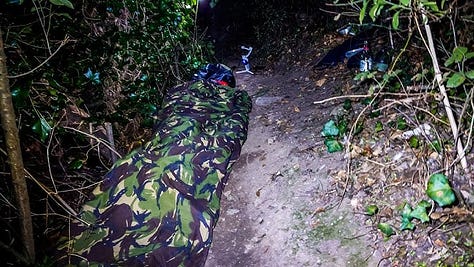
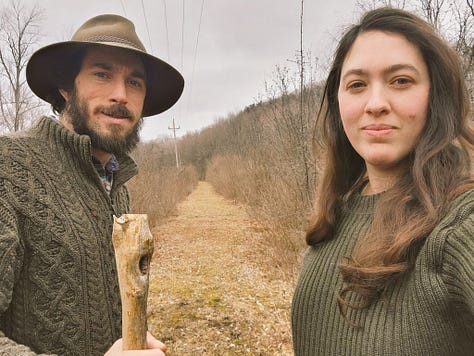
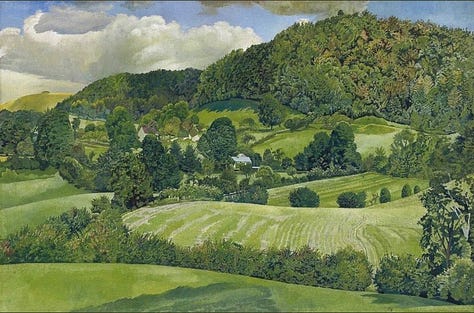
Regarding itinerance, not all will be called to live this way. But it bears mentioning that itinerance is an essential and immutable feature of the vast majority of the human genome. There are probably many highly disordered individuals whose disorder would be addressed by acknowledging their own proclivities for 'rambling' — and the development of a cohesive and lasting nomadic culture in North America would represent one of the most humane and hopeful developments imaginable for a great many people. Try as we may, we simply cannot erase the human urge to wander after nearly 200,000 years of species-wide itinerance.
3. What do you think is the future of the United States?
To be quite honest, I do not expect anything good. This does not prevent me from rising to my duty to defend the original, pre-modern ideal of America as it has manifested in the lives of the frontiersmen, pioneers, and progenitors of non-homogenized, non-cartoonized American culture. The development of American ideals that could take the form of a human monoculture has been the most devastating element of our recent history — and the manner in which this monoculture has melded into a hyper-industrialized and digital "global culture" has been a tragedy. If I defend America, I defend only the America of Huckleberry Finn and Johnny Appleseed and Thomas Jefferson; if a return to this conception of our country can actually occur, it will only occur from a mass revival of noncompliance with anti-American ideas and systems. These might include the IRS, the Social Security system, the DMV, building codes, endless overseas warfare, and the post-WWII 'keeping up with the Joneses' mentality. I am not actually optimistic about such a change taking place — but a large part of being American is attempting the impossible in spite of dismal odds.
The system may simply continue as it is, albeit with new grotesqueries added every year. We may sustain the present order with mass immigration, nuclear power, ultra-urbanism, and advanced, vaguely Soviet systems of digital and AI-based bureaucracy that effectively force compliance with the dominant paradigm's prerogatives. Or, some form of Balkanization may occur in the event that the undercurrents of resentment that are still present among this country's embittered yeomen are 'mismanaged' by the state and its agents of power. Perhaps in the best of cases, a true leader might be able to rise to a position of power who can, by sheer rhetorical force of will and his own vision, provoke in our citizenry a revival of original American values — though the combined forces of industrial technology, 'social' media, and democracy make this exceptionally unlikely.
Ultimately, I intend to stay in the United States for as long as I can. I have fully considered the possibility that I may at some point be forced into exile if ever the state should target me in any of the ways they have targeted dissidents before. But even if it should come to that, I will always remain an American and I will always write for the thinking American public who can identify our country's current path as being fundamentally contrary to the values on which the nation was founded — however small that demographic may be.
4. Why do you choose to live in the Northeast, and is your ideal lifestyle accessible in other places?
My calculus regarding the northeast is simple: Rain, groundwater, hardwood forest, good soil, and long winters constitute a more or less universal recipe for human success and thriving. Moreover, though I actively oppose many elements of the governments of so-called "blue states", I find I agree with them on one utterly crucial point — the protection of wilderness. The Adirondack Park in northern New York State is arguably the best-protected wildland in the United States. This protection is critical — in states that lack robust legal protections for wilderness and aggressive campaigns of enforcement of such laws, 'developers' inevitably destroy the beauty of the land and roll out a human monoculture of strip malls, strip mines, and strip clubs. No change in a human being's environs could be more ontologically destabilizing than that posed by the desecration and defoliation of the land on which one lives. Though I have warmed considerably to certain elements of civilization (in contrast to my decade as an 'anarcho-primitivist') I have nonetheless retained a general disdain for most of its projects. In my opinion, if a culture cannot help but build ugly, worthless buildings and roads — the land on which they might've built anything is best left as primeval wilderness. I would only entertain an alternative view on this point if we were in the business of building truly beautiful and edifying towns and roads — a practice that has been largely abandoned in North America for nearly a century.
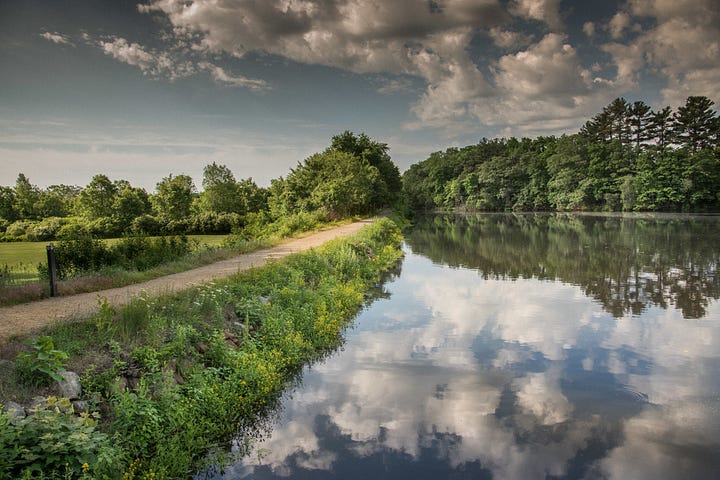
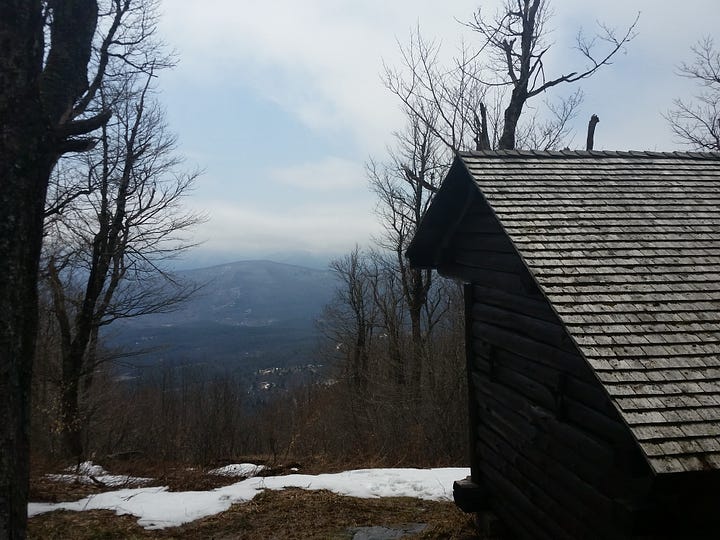
Moreover, I find the character of our old, haggard, cantankerous mountains and hillcountry regions to be congruent with my own personality. Land makes a man who he is, and man in turn is obligated to appreciate and protect those qualities. If he destroys the land, he destroys himself — if he leaves the land, he abandons his own bones and becomes a wandering ghost. Our hills are frugal, our weathered valleys and somber overcast is bastard-like and unshorn — our rivers have rambled through hundreds of years of man's projects and still wander, indefatigable in their elderly resolve and wildness. I've lived all over the country, and no other place makes as much sense for me — anywhere west of the Appalachians, east of the Berkshires, or south of West Virginia seems like a foreign country to me.
Could my conception of life exist elsewhere in America or even in the world? Verily, it could. Whenever a man exemplifies the land on which he lives, learning from it and embracing the order and principles it silently proposes for his life, he is living in a manner that I would always defend. This is true of the bleakest deserts and the greenest Olympic coastlines; it is true of the southern Bayous and probably of the Altai Mountains and the islands of Oceania. When a human being lives authentically, governed by his own conversations with the wild land around him, earnest in his disposition and rebellious toward whatever offends it — he is a friend to me, and moreover, he is liable to be happy and to give his children something worthwhile.
5. If you could solve one problem that we currently face, what would it be?
Well, I have long had the idea of 'anti-smartphone evangelism'. I would ride town to town on a large cargo bike onto which I've affixed broad boards of wood. I'd carry a crate of "flip phones" and give them out for free to anyone who'd nail their smartphone to the wooden boards in an effort to convince people to destroy their smartphones. I'm being a bit cheeky in proposing this, and absolutely telling on myself as an unrepentant Luddite — but it gets at the heart of the problem I'd really solve, which is that of suicide.
To me, the extreme alienation posed by the modern world — a world of Godlessness and neurotic worship of all things that can be measured, of reptilian brain-stem pleasures and a soul-withering absence of beauty and the warmth of human brotherhood -- is the source of our dismally high suicide rates. It is clear to me that the neglect and denial of the metaphysical realm has been a disaster the proportions of which have no comparison in any previous human society. There is a 'certain something' — an immeasurable quality — to all things, from the honeydew in the bowl to the kiss of a lover to the feeling in one's boots as they walk the paths of wild forests to bustling city streets. It cannot be charted or graphed; it is ineffable, and these ineffable qualities were formerly of central concern to virtually every human society that has ever existed. Whether it was shamanic mystics in Kamchatka or Franciscan Friars in Bolivia or even snake-handling hymn-singing preachers in Alabama — romance seems to have only been able to spring from the immeasurable qualities of the living world. Absent this, the soul dies in a hall of mirrors and yardsticks and pie-charts and Powerpoints — a man simply cannot live by the machinations of his own rationality and its petrified, voidlike fruits.
I would solve this problem by launching a worldwide campaign against measurement. Clocks would be destroyed, telephones, computers, measuring-cups, tape measures. Economists would be paid to shut up. Stock exchanges would be turned into goat-pens. Every Church door would be open daily — maybe even 24/7. Vigils would be held for victims of suicide. Every doctor and pharmaceutical corporation executive hawking depression pills would be exiled to an uninhabited island in the Aleutians. For one year, we'd have a jubilee against measurement and a global rekindling of every form of romance. Of course I am dreaming, but the vision I present here should suffice to express my thoughts on the matter of suicide and the overall climate of despair that now seems to predominate in the West and elsewhere.
6. Do you believe that localists should utilize social media, or focus on offline projects?
This is a hard question for me to answer. I don't even own a smartphone — I do 100% of my work on a laptop. I often get the urge to shoot my laptop and my flip-phone and to solely use the library for my work; I don't actually think this is such a fantasy. The library is the best place to use the internet. It's social, you are not alone with the unholy powers of the digital sphere — and you cannot stay past the closing hour. When the doors of the library close, if you have no internet at home and no smartphone — you simply return to real life. I do not accept the distinction that the internet is 'real life' — to me, those who make this claim are only coping with their addiction to the internet. We all suffer from it, but re-framing this addiction as something normal is not beneficial in really any regard. We should simply attempt to leverage the benefits of the internet into the face-to-face social realm by trying to predominantly use the internet in public and side-by-side with our neighbors. Again, like many of my views on things, maybe this is idealistic, but I think there is something to it.
My introduction to Twitter came solely because I was assigned a desk job in the military. I was ordered to sit in a server room every day, where there simply was no tasking of any kind. Forbidden to read on duty, I decided to purchase a smartphone and started posting on Twitter every day. Little did I know, this would set me up for my now-nascent career as a writer. So without a doubt, I can't deny the utility of digital tools — without my use of Twitter, I wouldn't have found one one-hundredth of the success I've found so far, nor would I have met my woman. Nevertheless, I still insist on trying to arc towards "IRL" interactions in all that I do online. My house is open to my readers as a waystation on trips; I host people all the time, and I'm getting a beer with one of my readers in an hour. The more extensively we can move our networks offline, the more resilient they are to the fickle changes that online communities can often be subject to — changes in moderation, shuttering of websites, algorithmic changes, and so on can easily devastate online groups. If we're already offline together, we're simply not subject to that.
7. What is the value in rambling around to you, if you have already explored so much?
That's a good question — I've extensively traveled in all 48 contiguous US States, as well as several states in Northern Mexico and six Canadian provinces. I've hitchhiked coast-to-coast more times than I can count. To say that I am 'bored' by traveling in the US might seem a little jaded, and so I will refrain from saying exactly that — but I can satisfactorily say that I have outgrown a life of constant traveling across America. Now, three forms of travel appeal to me: Traveling across the States with more precision in an effort to seek out communities that exemplify the values I find interesting or hopeful, international travel of the same sort, and seasonal, cyclical travel in a focused region. On this latter point, it should be mentioned that the word 'nomad' is often misused — the vast majority of true nomads past and present ran a fairly tight range on a seasonal basis, often in the same watershed or bioregion. Their range was limited by walking and governed by the seasons. As I and my woman contemplate raising a family nomadically, we're tempted to purchase a few cheap pieces of rural acreage from West Virginia to Maine, and to travel between them on a regular, seasonal basis. This configuration allows for some constancy — which is good for children especially — while still satisfying the proclivity to 'ramble' in both of us. It is perhaps the best approximation of primordial nomadism that could be accomplished in the present-day United States.



As goes the value of rambling itself, there's a certain elegance to it — knowing every pocket of one's rucksack and its contents, all of it tidily strapped to one's back, the geometry of the bones in the back and legs all acting in harmony from rucksack to pavement in forward motion with eyes open. The body is atheletically charged as he goes, syncing his position up with the maps — either on paper or in the mind — and he is gingerly noting the position of the sun, eating little meals, looking for a place to tie his tarp. I find the openheartedness of this whole ensemble to be spiritually enlivening — it gives my mind enough to 'chew on' such that I can interact more fully with those I meet. Sedentary life is too simple, too easy, too hamfisted — my mind devours itself when I sit for too long. The 'itch' returns — it might be in my blood. Though I never met my father, he and most of the men on his side have been itinerant for most of their lives going all the way back to Scotland, where they were 'tinkers' and circus showmen. I'm not above imagining that 'blood memory' exists — and that we are in some sense governed by our own forerunners and whatever metaphysical or genetic legacy they passed on to us today.
There is also a metaphorical earnestness in the vocation of the traveler; just as the active intellect descends into schlerotic atrophy the moment he gives himself over to being a partisan — 'sedentizing' the mind and heart — is one's position upon the map any different? Imprecision is the hallmark feature of true rambling — be it philosophical or literal — and this imprecision can yield a more dynamic understanding of place, self, truth, and God. It is only when the mind grasps for some sort of a 'hard point' that rot can set in. The red-eyed fundamentalist is often only seeking to recreate the moment of his arrival at his position — the communist and the religious zealot have a great deal in common in this respect. While it is not impossible to dynamically adhere to a place or an idea, it is markedly more difficult and riddled with risks. 'Rambling' allows for a relative freedom from these risks more often than not.
What deepens this truth is also the reality that on a day-by-day basis, the country is never the same. The simple randomness of pedestrian traffic on city streets, the movement of birds, the pitch of parish church homilies, the 'mood' of whole peoples — all of these things comprise a living organism in which both the partisan and the sedentary one are by default trapped in a miasma of puppets they've fashioned to keep them company. The readiest remedy for their strange affliction is often to move with imprecision and without expectation of certain 'arrival'. Without the 'lightness of mind' that such a state generates, innovation, dynamism, and real understanding are more often than not impeded — or even impossible. This idea should have currency even among those who are not hitchhikers or anti-civilization dropouts; I would submit that it is an essential truth of edifying and worthwhile human thought.
8. If you could tell our readers one thing, what would it be?
Like Henry Lightfoot in Edward Abbey's novel The Fool's Progress — shoot your refrigerator. Build an icehouse or a spring box. Stoke up the woodstove. Eat the roadkill. Build your son a river raft. Light your tax bill on fire. There simply isn't any reason to pussyfoot around — America is a wild country and without the aplomb of our rebels and woodchucks and principled dropouts, this country is only a stars-and-stripes strip mall. Even if you aren't an American, there is something definitively human about saddling up and riding your own principles out into the wind with a hearty laugh and an intellectual gait that drips with style and playful imprecision. Even if you aren't a hobo, squatter, or nomad — the psychological province of such people is nonetheless accessible to you. If you're going to receive the Eucharist — believe it. If you're going to make a dinner — make it the richest, most high-flying dinner you've ever served. Saunter through life — ramble. Don't accept a lick of complicity in things that seem downright untoward to you, but by the same token, keep clear of disgruntlement and partisan thinking. None of this is an exhortation to revolution — it's merely a simple reminder to be human in a way that is at once ruddered and romantic. Without this, I'm not sure anyone can really live.
If you’ve enjoyed this interview, consider giving the Philosophical Rambler your support, and note that the comments here are open to all. I’ll be interested to see what discussion these reflections might provoke here. Have a fantastic week. Now — I must return to working on my book.





A prodigious amount of philosophically nutritious food for thought, wonderful pictures...God bless!
Thanks for the shout outs, Andy, I look forward to reading this later today.
Believe it or not, I’m in process of hooking up two other people with article opportunities at Newsweek - I want all of my friends to get their ideas and thoughts out there.